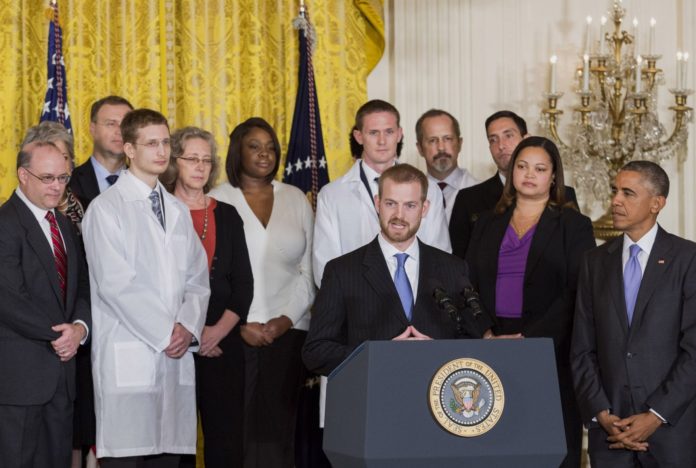In August 2014, when two American aid workers battling the Ebola epidemic in Liberia fell ill with the disease themselves, their international relief organization began a frantic search for a medical miracle. With time running out for Kent Brantly and Nancy Writebol, the group heard of an experimental medication that had been tested only on non-human primates.
Within days, a few doses of ZMapp were on their way in frozen vials to West Africa, where they were administered to both workers. Both recovered from the usually fatal hemorrhagic disease.
It was impossible then, and remains impossible now, to determine what part the medicine might have played in Brantly and Writebol’s survival. But the first controlled clinical trial of the medication shows promising results, according to federal authorities and the company that makes the drug, which said it will push forward with requests for a license from the Food and Drug Administration.
Because Ebola was brought under control in West Africa before the study could be completed, there were too few subjects in the experiment to consider the results conclusive. But Anthony Fauci, director of the National Institute of Allergy and Infectious Diseases, which sponsored the research along with the the ministries of health of three West African nations and others, said Tuesday that “the trends are all in the right direction.”
“I think the trend is strong enough that if we put this in front of the regulatory authorities, combined with the good animal data, I think there is a reasonable chance that they may favorably consider this,” Fauci said, referring to the FDA.
In response to the initial results, the FDA has encouraged Mapp Biopharmaceutical to continue making ZMapp available to patients outside of a clinical trial even though it is still experimental, a spokeswoman for the agency said.
There is no approved therapy for Ebola, which killed 11,301 people and sickened 28,603 in Liberia, Sierra Leone and Guinea in 2014 and 2015. Before the most recent outbreak, part of the problem had been lack of interest from drug companies because of the small number of people affected by the disease. But after the West African epidemic, the effort to develop a treatment intensified, supported by government funding — a pattern that is now being repeated in the Zika outbreak in Latin America.
Nor is there a vaccine for Ebola, though one has been tested in Guinea and Sierra Leone and the interim results are promising.
Two groups of patients were compared in the experiment, conducted in the three hard-hit West African countries and in the United States, where one person received the drug. Thirty-five people received the current standard of care, which involved separating them from the general population, giving them fluids and electrolytes and providing other care and support as needed. The second group, 36 patients, received the same care plus three infusions of ZMapp, a cocktail of monoclonal anti-bodies developed by the company. Researchers had hoped to enroll 200 subjects.
In the ZMapp group, eight people died, compared with 13 in the other group. The patients given ZMapp also cleared the virus from their bloodstreams and overcame symptoms more quickly, and were discharged earlier than patients in the other group, according to a news release distributed by the company. The results also were presented at the Conference on Retroviruses and Opportunistic Infections in Boston last week.
In its statement, Mapp Biopharmaceutical president Larry Zeitlin said company officials “are encouraged by these results. The outcome of this truncated study is supportive of ZMapp’s antiviral activity in humans. While this trial is not definitive, its results are consistent with the favorable results observed in animal efficacy testing in nonhuman primates.”
Fauci agreed that the therapy had shown the best results to date, though without statistically significant data, it cannot be considered proven. “I feel good about the data, but it’s not a home run,” he said.






